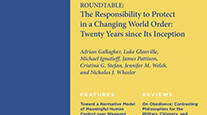This short clip on ethics asks: Who pays to stop global warming? How to allocate emissions allowances? If people are entitled to an equal share of the world's resources, should national allowances be allocated on a per capita basis? How about the billionaire in India who pollutes more than a poor person in urban Paris?
Who pays to stop global warming?
At the root is a mismatch between global and domestic incentives: trying to solve climate control, a global problem, with a treaty between nations.
China's annual emissions are on par with the U.S., but average Chinese pollute a third as much as average Americans, and the world doesn't have decades to allow China to develop without emissions reductions.
So, how to allocate emissions allowances? If people are entitled to an equal share of the world's resources, should national allowances be allocated on a per capita basis? How about the billionaire in India who pollutes more than a poor person in urban Paris?
Often the polluter pays. Then the historical burden falls on advanced industrial economies. They burned energy to become wealthy, and their waste persists in the atmosphere.
However, limiting their prosperity may be unjust, helping poorer countries develop cleanly may be more cost effective, and redistributing wealth and technology to poorer societies may not work in a global climate treaty.
The price of inaction could be costlier than most reasonable solutions.
Are we all in it together? Who should sacrifice? How?
By Evan O'Neil


